Acts of Service: The Complete Guide to Showing Love Through Actions
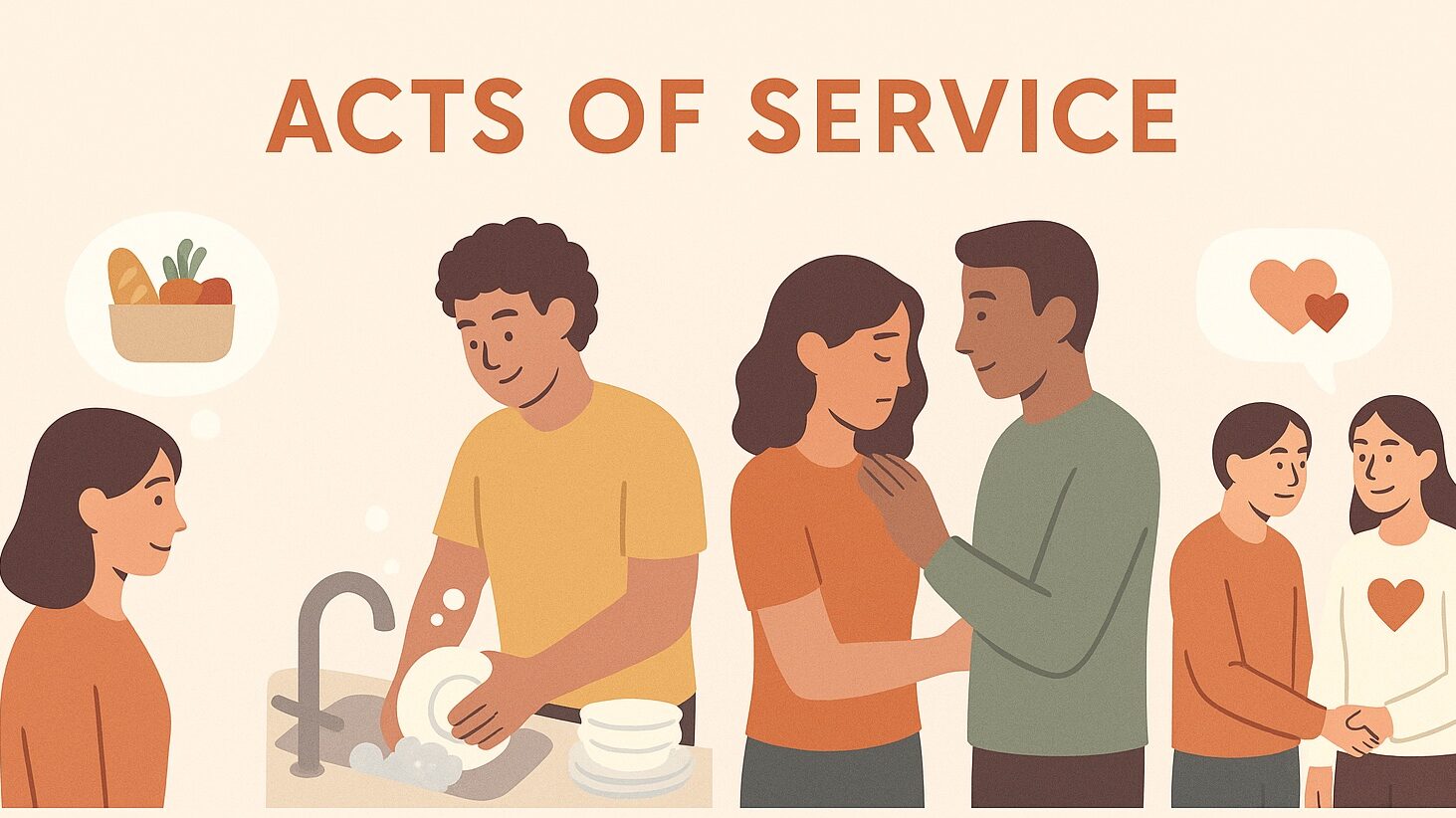
Acts of Service: The Complete Love Language Guide (2025)
“I do everything for this family, but nobody seems to notice or care.”
Maria works full-time, handles most of the household responsibilities, manages the family calendar, and takes care of countless daily tasks that keep her family’s life running smoothly. Her husband tells her he loves her regularly and brings her flowers occasionally, but she feels emotionally empty. What she craves isn’t words or gifts—it’s someone to notice her burden and actively help shoulder the load.
For Maria, whose primary love language is Acts of Service, love is spelled H-E-L-P. When someone notices what needs to be done and takes action without being asked, it communicates care more powerfully than any verbal declaration or thoughtful present ever could.
If you’ve ever felt invisible despite your endless efforts to help others, or if you struggle to understand why someone would rather have you do the dishes than hear “I love you,” this comprehensive guide will help you navigate the meaningful but often misunderstood world of showing love through action.
Understanding Acts of Service: Love in Action

Acts of Service as a love language centers on the principle that actions speak louder than words. For people with this love language, genuine love is demonstrated through thoughtful, helpful actions that make life easier, reduce stress, or show care through practical support.
Research in relationship psychology shows that Acts of Service create lasting emotional impact because they require time, energy, and thought—valuable resources that demonstrate genuine care. Unlike words, which can be said quickly, or gifts, which can be purchased, Acts of Service require personal investment of effort and attention.
Core Elements of Acts of Service:
Anticipating Needs:
- Noticing what would be helpful before being asked
- Understanding someone’s routine and proactively supporting it
- Recognizing stress points and offering practical solutions
- Observing what someone struggles with and providing assistance
Thoughtful Action:
- Taking time to do something meaningful for another person
- Putting effort into tasks that benefit someone else
- Choosing actions that specifically address someone’s needs or preferences
- Following through on commitments and promises consistently
Reducing Burdens:
- Taking over tasks that someone finds stressful or time-consuming
- Handling responsibilities so others can focus on what’s important to them
- Solving problems before they become overwhelming
- Creating ease and comfort in daily life through helpful actions
Demonstrating Care Through Effort:
- Investing time and energy in ways that show someone they matter
- Learning new skills to better help or serve someone
- Prioritizing someone else’s needs through practical action
- Showing up consistently with reliable, helpful behavior
The Psychology Behind Why Actions Matter

For people whose primary love language is Acts of Service, helpful actions create unique psychological benefits that other expressions of love cannot fully replicate.
Emotional Impact of Service:
When someone performs an Act of Service, it communicates several powerful messages:
- “I see you and your needs”
- “You matter enough for me to invest my time and energy”
- “I want to make your life easier and better”
- “You can count on me for practical support”
Stress Reduction and Security:
Acts of Service directly reduce practical stress and create emotional security. When someone consistently helps with tasks and responsibilities, it creates a sense of partnership and support that builds long-term relationship satisfaction.
Recognition and Validation:
For people who naturally give through service, having their efforts recognized and reciprocated validates their contributions and reinforces their value in relationships.
Trust Building:
Research shows that consistent helpful actions build trust more effectively than promises or declarations. When someone reliably follows through with practical support, it creates deep confidence in the relationship.
Common Misconceptions About Acts of Service

Acts of Service is often misunderstood, leading to unmet needs, resentment, and missed opportunities for meaningful connection.
Misconception 1: “Acts of Service is just about household chores”
Reality: While household tasks can be Acts of Service, this love language encompasses any thoughtful action that helps, supports, or benefits another person. It includes professional support, emotional assistance through practical means, creative projects done for others, and countless non-domestic helpful actions.
Impact of misconception: People dismiss the emotional significance of practical help and miss opportunities to show love through non-household actions.
Misconception 2: “People with this love language are just lazy or demanding”
Reality: People whose love language is Acts of Service often give extensively through service themselves. They’re typically highly capable individuals who appreciate when others share the load rather than leaving all practical responsibilities to them.
Impact of misconception: Their need for practical support is mischaracterized as laziness rather than recognized as a legitimate emotional need.
Misconception 3: “Acts of Service means doing everything for someone”
Reality: Healthy Acts of Service involves thoughtful, voluntary help that enhances someone’s life without creating dependency or resentment. It’s about meaningful assistance, not taking over all responsibilities.
Impact of misconception: People either avoid giving any practical help or go overboard and create unhealthy dynamics.
Misconception 4: “Acts of Service aren’t as meaningful as other love languages”
Reality: For people with this love language, practical help communicates love as powerfully as verbal affirmation or physical touch. The investment of time and energy required makes these actions deeply meaningful.
Impact of misconception: Acts of Service are treated as basic courtesy rather than expressions of love, leaving people feeling unappreciated.
Recognizing Acts of Service as a Love Language

Learning to identify when someone values Acts of Service helps you connect with them more effectively while understanding their natural way of expressing care.
Signs Someone’s Love Language is Acts of Service:
They Naturally Help Others:
- They’re often the first to offer practical assistance during challenges
- They notice what needs to be done and take action without being asked
- They express love by doing things for people they care about
- They take pride in their ability to help and support others effectively
They Notice and Appreciate Practical Help:
- They seem especially grateful when someone helps with tasks or responsibilities
- They remember and mention when someone made their life easier through action
- They appear visibly relieved when someone takes over a burden or responsibility
- They express appreciation for practical support more than other gestures
They May Feel Unappreciated When Help Isn’t Offered:
- They seem frustrated when they’re handling all practical responsibilities alone
- They may comment on being overwhelmed with tasks and duties
- They appear hurt when others don’t notice their efforts or reciprocate with help
- They may withdraw emotionally when feeling practically unsupported
They Express Stress Through Task Overload:
- They frequently mention being busy, overwhelmed, or having too much to do
- They may seem anxious about unfinished tasks or looming responsibilities
- They appear more relaxed and happy when practical support is available
- They may struggle to enjoy leisure time when practical matters are unresolved
What Acts of Service Look Like in Practice:
Daily Life:
- Handling routine tasks without being asked or reminded
- Taking care of errands that save others time and effort
- Maintaining shared spaces and responsibilities proactively
- Anticipating needs and addressing them before they become problems
During Stress:
- Taking over additional responsibilities when someone is overwhelmed
- Handling practical details during difficult times (illness, work pressure, family crisis)
- Problem-solving and providing concrete solutions to challenges
- Creating calm and order in chaotic situations through practical action
Special Occasions:
- Planning and executing events, celebrations, or special experiences
- Taking care of all the details so others can enjoy without worry
- Creating meaningful experiences through thoughtful preparation and execution
- Giving gifts of time and effort rather than purchased items
Effective Acts of Service: What Works and What Doesn’t

Not all helpful actions carry the same emotional weight for people whose love language is Acts of Service. Understanding the difference between meaningful service and basic courtesy is crucial.
What Works: Thoughtful, Voluntary Service
Anticipatory Help: Instead of: Helping only when asked Try: Noticing what needs attention and taking care of it proactively, like filling up someone’s car with gas when you notice it’s low
Personalized Service: Instead of: Generic helpful actions Try: Tailoring your service to their specific needs and preferences, like preparing their coffee exactly how they like it every morning
Consistent Support: Instead of: Occasional grand gestures Try: Regular, reliable help with ongoing responsibilities, like consistently handling a weekly task they find stressful
Service During Stress: Instead of: Helping only when convenient for you Try: Stepping up with practical support precisely when they need it most, like taking over meal preparation during their busy work period
What Doesn’t Work: Begrudging or Self-Serving Service
Avoid Keeping Score:
- Helping while expecting immediate reciprocation or recognition
- Mentioning your service frequently or making it about your generosity
- Using your help as leverage in arguments or negotiations
Avoid Half-Hearted Efforts:
- Doing tasks poorly so you won’t be asked again
- Helping with obvious reluctance or complaints
- Taking shortcuts that create more work rather than less
Avoid Self-Serving Service:
- Helping with things that primarily benefit you rather than them
- Taking over tasks in ways that suit your preferences rather than theirs
- Using service as a way to control or direct their choices
Avoid Conditional Service:
- Helping only when you’re in a good mood or getting along well
- Withdrawing practical support during conflicts or disagreements
- Making your help contingent on their behavior or attitude
Acts of Service in Different Relationships

Acts of Service appears differently across various relationship contexts, but the core principle—showing care through helpful action—remains consistent.
In Romantic Relationships:
Daily Partnership:
- Sharing household responsibilities equitably and proactively
- Taking care of tasks your partner dislikes or finds stressful
- Handling practical details of shared life (bills, scheduling, maintenance)
- Supporting each other’s goals through practical assistance
During Challenges:
- Taking over additional responsibilities when your partner is overwhelmed
- Providing practical support during illness, job stress, or family crises
- Problem-solving together and taking action to address difficulties
- Creating stability through reliable, helpful behavior during uncertain times
Romantic Service:
- Planning date nights and handling all the logistics
- Creating special experiences through thoughtful preparation
- Taking care of practical details so your partner can relax and enjoy
- Showing love through actions that specifically benefit their well-being
In Parent-Child Relationships:
For Children:
- Helping with homework, projects, and school responsibilities
- Teaching life skills through doing activities together
- Taking care of their needs proactively (meals, clean clothes, organized spaces)
- Supporting their interests and activities through practical involvement
For Adult Children:
- Helping with major life transitions (moving, job changes, relationship changes)
- Providing practical support during challenging times without taking over
- Sharing skills and knowledge that help them become more capable
- Being available for practical assistance while respecting their independence
In Friendships:
Mutual Support:
- Helping friends move, handle emergencies, or manage overwhelming situations
- Offering practical skills (computer help, car maintenance, home projects)
- Taking care of details when friends are dealing with major life events
- Being reliably available when practical help is needed
Thoughtful Service:
- Bringing meals during illness or stressful times
- Helping with wedding planning, baby preparations, or other major events
- Pet-sitting, house-sitting, or handling responsibilities during travel
- Offering expertise in areas where you have skills they need
In Professional Settings:
Team Support:
- Taking on additional tasks during busy periods or when colleagues are overwhelmed
- Sharing expertise and helping team members develop skills
- Handling details that help projects run smoothly
- Being reliable and dependable in ways that support collective success
Leadership Through Service:
- Removing obstacles that prevent team members from doing their best work
- Providing resources, training, and support that help others succeed
- Taking care of administrative details so others can focus on their strengths
- Creating systems and processes that make everyone’s work easier and more effective
Daily Practice: Making Acts of Service Natural

Building a habit of service requires developing awareness of others’ needs and creating systems for consistent helpful action.
Developing Service Awareness:
Notice Stress Points: Pay attention to when the people you care about seem overwhelmed, frustrated, or struggling with particular tasks or responsibilities.
Observe Patterns: Learn the routines, preferences, and challenges of important people in your life so you can anticipate where help would be most appreciated.
Ask Strategic Questions:
- “What’s the most stressful part of your week?”
- “What takes up too much of your time?”
- “What would make your day easier?”
- “Is there anything you’ve been putting off that I could help with?”
Creating Service Habits:
Morning Service: Start each day with one helpful action that benefits someone else—making coffee for your partner, handling a task for a family member, or preparing something that will make their day easier.
Proactive Problem-Solving: When you notice a recurring challenge or frustration, think of ways to address it through practical action rather than just offering sympathy or advice.
Evening Service: End each day by doing something that prepares for tomorrow’s success—setting up coffee for the morning, organizing items someone will need, or handling a task that will reduce tomorrow’s stress.
Service Planning:
Weekly Service Goals: Identify one significant way you can help each important person in your life during the upcoming week, then follow through consistently.
Seasonal Service: Plan for predictable stressful periods (back-to-school, tax season, holiday preparation) by proactively offering increased practical support.
Emergency Service Preparedness: Develop skills and resources that allow you to provide meaningful help during unexpected challenges—basic cooking, simple repairs, organizational abilities, or other practical capabilities.
Overcoming Common Acts of Service Challenges

Many people want to show love through Acts of Service but encounter obstacles that prevent effective expression of this love language.
Challenge 1: “I don’t know what would be helpful”
Solution:
- Observe daily routines and notice what creates stress or takes significant time
- Ask specific questions about what would be most helpful rather than generic offers
- Start with obvious needs (meals, transportation, household tasks) and build from there
- Pay attention to what they complain about or mention finding difficult
Challenge 2: “I’m not good at practical tasks”
Solution:
- Focus on service that matches your existing skills and abilities
- Learn basic helpful skills gradually (cooking simple meals, basic organization, etc.)
- Offer service in areas where you do have expertise or natural ability
- Remember that effort and thoughtfulness matter more than perfect execution
Challenge 3: “I don’t have time to help others”
Solution:
- Start with small, quick acts of service that don’t require major time investment
- Look for ways to be more efficient with your own tasks so you have capacity to help
- Recognize that meaningful service doesn’t always require large amounts of time
- Consider how Acts of Service can be integrated into activities you’re already doing
Challenge 4: “They never seem to appreciate my help”
Solution:
- Check whether your service addresses their actual needs rather than what you think they should need
- Ensure your help truly makes their life easier rather than creating different work
- Consider whether they might prefer different expressions of love alongside Acts of Service
- Communicate about how to help more effectively rather than assuming your current approach is ideal
When Acts of Service Becomes Problematic

Like any love language, Acts of Service can become unhealthy when it’s used inappropriately or taken to extremes.
Red Flags to Watch For:
Creating Dependency:
- Doing so much for someone that they become unable or unwilling to handle basic responsibilities
- Taking over tasks that they should learn to do for themselves
- Using service to maintain control or prevent someone’s independence
- Creating situations where your help becomes mandatory rather than optional
Martyrdom and Resentment:
- Helping while internally keeping score or expecting specific appreciation
- Using your service as evidence of your superiority or their inadequacy
- Complaining about how much you do while continuing to do everything
- Making others feel guilty about accepting help or not reciprocating immediately
Boundary Violations:
- Providing unwanted help or service that makes others uncomfortable
- Taking over responsibilities without permission or agreement
- Ignoring when someone asks you not to help with particular tasks
- Using service as an excuse to control how things are done
Service as Manipulation:
- Helping in order to create obligation or debt in relationships
- Withdrawing service as punishment during conflicts
- Using your helpfulness to avoid other forms of emotional intimacy
- Expecting service to solve relationship problems that require communication
Healthy Boundaries with Acts of Service:
Mutual and Voluntary:
- Ensure that service is freely given and freely received
- Maintain balance so that both people in the relationship give and receive help
- Respect when someone wants to handle tasks independently
- Communicate openly about service preferences and boundaries
Empowering Rather Than Enabling:
- Help in ways that support someone’s goals and growth rather than creating dependency
- Teach skills and provide resources rather than always doing tasks yourself
- Encourage independence while offering support when it’s truly needed
- Focus on service that enhances rather than replaces someone’s capabilities
Cultural and Gender Considerations in Acts of Service
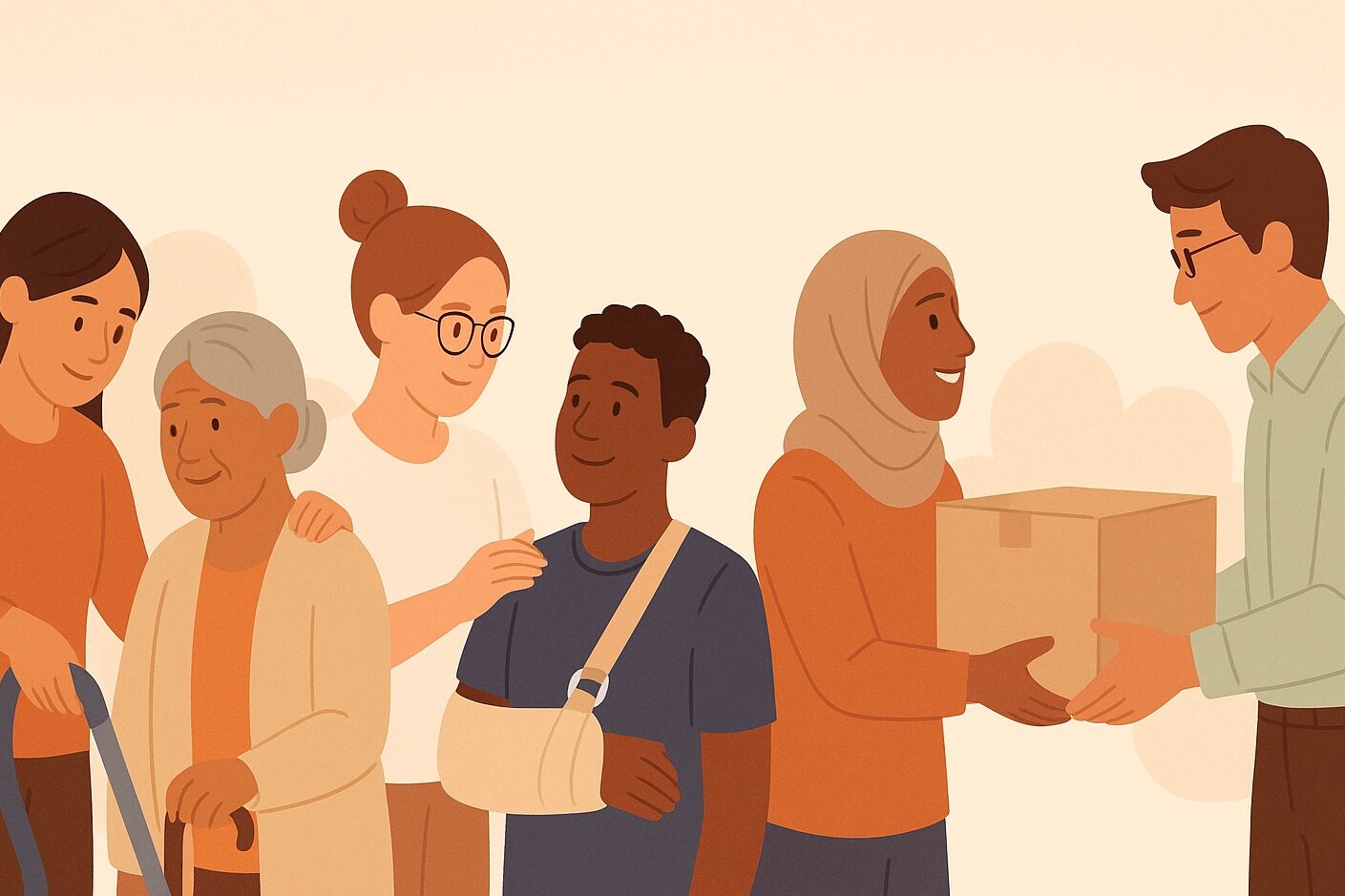
Cultural backgrounds and gender expectations significantly influence how Acts of Service is expressed, received, and interpreted.
Cultural Variations:
Service-Oriented Cultures:
- Some cultures place high value on practical help and mutual assistance within families and communities
- Acts of Service may be expected rather than seen as special expressions of love
- Understanding cultural context helps determine what level of service is appropriate and meaningful
Individual Achievement Cultures:
- Cultures that emphasize independence may view extensive service as interference or lack of respect for autonomy
- Acts of Service may need to be offered more carefully and with explicit permission
- Balance between helping and respecting independence becomes particularly important
Gender Expectations and Acts of Service:
Traditional Gender Roles:
- Historically, women have been expected to provide Acts of Service through domestic labor
- Men’s Acts of Service have often been limited to specific areas like home maintenance or financial provision
- Modern relationships benefit from expanding service expressions beyond traditional gender boundaries
Avoiding Gendered Assumptions:
- Don’t assume that certain types of service are naturally male or female responsibilities
- Encourage Acts of Service that match individual skills and preferences rather than gender stereotypes
- Recognize that both men and women can show and receive love through all types of helpful action
Navigating Cultural and Gender Differences:
- Discuss service expectations openly rather than assuming shared cultural understanding
- Be aware of how family backgrounds influence service expectations and preferences
- Respect cultural differences while communicating individual needs and preferences
- Focus on mutual care rather than fulfilling traditional role expectations
Building Acts of Service Skills Progressively
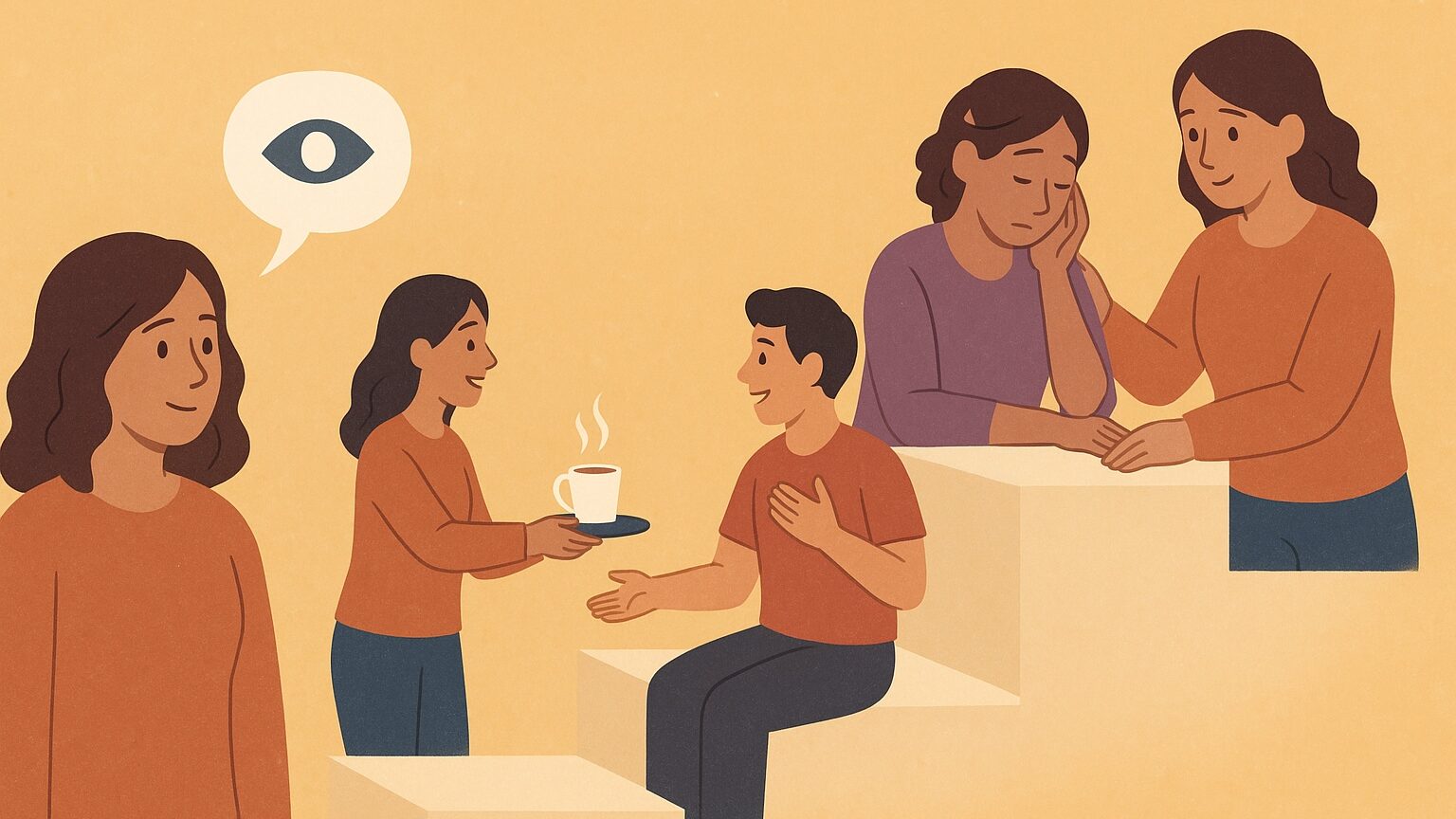
If Acts of Service doesn’t come naturally to you but you want to connect better with someone who values it, developing these skills gradually will feel more authentic and sustainable.
Progressive Skill Development:
Week 1-2: Observation and Awareness
- Notice when others provide helpful service and observe the responses they receive
- Pay attention to tasks and responsibilities that create stress for people you care about
- Begin recognizing Acts of Service expressions in your daily environment
- Identify areas where you already have skills that could be helpful to others
Week 3-4: Simple, Consistent Service
- Start with one small, regular Act of Service for someone important to you
- Focus on consistency rather than grand gestures
- Choose service that matches your existing abilities and doesn’t create stress for you
- Pay attention to which types of help seem most appreciated
Week 5-8: Expanding Service Repertoire
- Gradually add different types of helpful actions to your regular routine
- Learn basic skills that allow you to help more effectively (cooking, organization, etc.)
- Practice anticipating needs rather than waiting to be asked for help
- Experiment with service in different relationship contexts
Week 9-12: Advanced Service Skills
- Develop ability to provide meaningful help during stressful or challenging times
- Learn to balance helpful service with respect for others’ independence
- Practice communicating about service preferences and boundaries
- Integrate Acts of Service naturally into your regular relationship patterns
Overcoming Common Learning Barriers:
“I’m not naturally helpful”: Start with service that uses skills you already have, then gradually expand your capabilities. Focus on willingness and consistency rather than perfect execution.
“I feel awkward offering help”: Begin with close family members or friends who will appreciate the effort even if the execution isn’t perfect. Practice makes offering service feel more natural over time.
“I don’t want to create obligation”: Make it clear that your help is freely given without expectation of reciprocation. Focus on the joy of helping rather than what you might receive in return.
“I’m worried about doing things wrong”: Ask for guidance when needed, but remember that thoughtful effort is more important than perfect results. Most people appreciate genuine attempts to help even when the outcome isn’t ideal.
Acts of Service Across the Lifespan

The expression and reception of Acts of Service evolves throughout different life stages, requiring adjustment and adaptation over time.
Acts of Service in Different Life Stages:
Young Adults:
- Learning to balance independence with accepting appropriate help from others
- Developing practical skills that allow meaningful service to others
- Establishing patterns of mutual assistance in friendships and romantic relationships
- Understanding the difference between helpful service and enabling dependency
Established Adults:
- Balancing service to partners, children, and aging parents
- Using professional skills and resources to provide meaningful help to others
- Teaching practical skills to children and younger adults through service
- Managing time and energy to sustain helpful service without burnout
Older Adults:
- Continuing to contribute through service even as physical capabilities may change
- Accepting help gracefully while maintaining dignity and independence
- Sharing lifetime skills and knowledge through practical assistance to others
- Adapting service expressions to match changing abilities and circumstances
Special Life Circumstances:
New Parents:
- Acts of Service become especially important during the overwhelming period of caring for infants
- Help with meals, household tasks, and childcare support can be deeply meaningful
- Service that allows new parents to rest, bond with their baby, or maintain other relationships
- Understanding that practical support often matters more than advice or suggestions
Career Transitions:
- Practical support during job searches, career changes, or professional development
- Help with networking, skill development, or managing daily life during transition periods
- Service that reduces stress and creates space for focusing on career goals
- Support that empowers rather than creates dependency during uncertain times
Health Challenges:
- Acts of Service become crucial during illness, injury, or chronic health conditions
- Help with daily tasks, medical appointments, and household management
- Service that maintains dignity while providing necessary practical support
- Understanding that service needs may be temporary or require long-term adjustment
The Long-Term Impact of Consistent Acts of Service
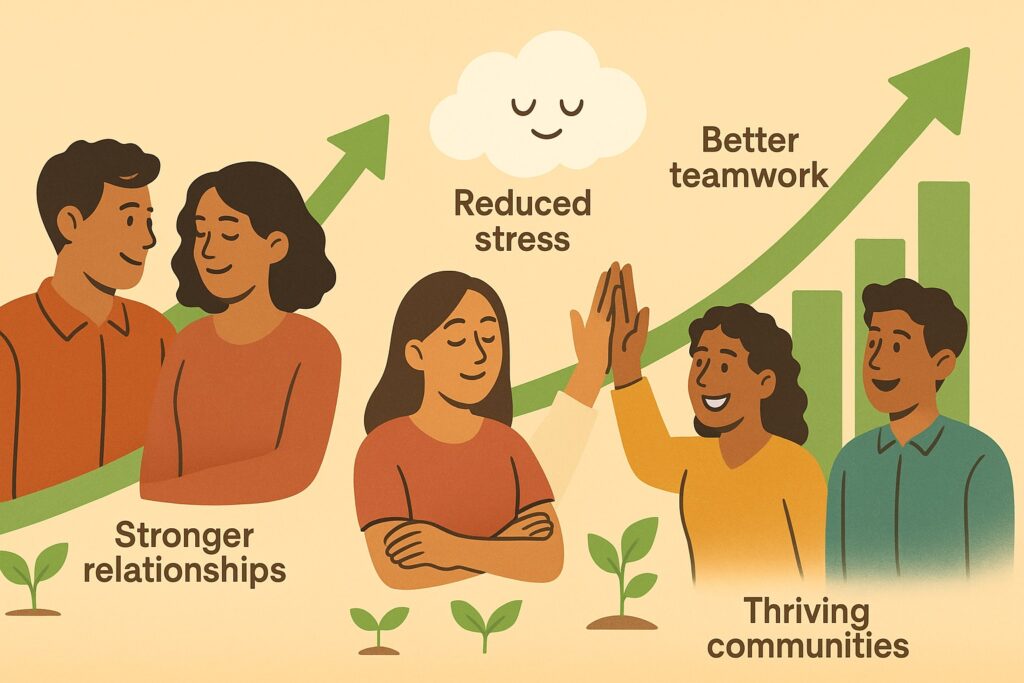
When practiced consistently and appropriately over time, Acts of Service creates profound positive changes in relationships and communities.
Relationship Benefits:
Deepened Trust and Security: Regular, reliable Acts of Service build confidence that you can count on each other for practical support during both ordinary and challenging times.
Enhanced Partnership: Sharing practical responsibilities creates genuine partnership and reduces the burden on any one person to handle everything alone.
Increased Appreciation: Both giving and receiving meaningful service increases gratitude and recognition of each person’s contributions to the relationship and family.
Improved Stress Management: When practical burdens are shared through Acts of Service, stress levels decrease and overall relationship satisfaction increases.
Individual Benefits:
Skill Development: Learning to provide Acts of Service develops practical capabilities and problem-solving skills that benefit all areas of life.
Sense of Purpose: Being able to help others meaningfully through practical action creates a sense of purpose and contribution.
Emotional Satisfaction: There’s deep satisfaction in making someone’s life easier or better through your actions and effort.
Reciprocal Support: People who consistently provide Acts of Service often receive practical help when they need it most.
Community Impact:
Stronger Social Networks: Communities where Acts of Service are common develop stronger bonds and better support systems for all members.
Practical Problem-Solving: Groups that embrace service as a love language become more effective at addressing practical challenges and supporting members during difficulties.
Skill Sharing: Acts of Service often involve teaching and learning practical skills, creating communities with broader capabilities and knowledge.
Conclusion: The Power of Love in Action

Acts of Service represents one of the most tangible and practical expressions of love. When we show care through helpful action, we communicate that someone matters enough for us to invest our time, energy, and effort in making their life better.
For people whose primary love language is Acts of Service, helpful actions aren’t just nice gestures—they’re essential expressions of love that create emotional security and deep appreciation. When we learn to recognize opportunities for meaningful service and follow through with consistent, thoughtful action, we build relationships characterized by partnership, support, and genuine care.
Whether you naturally express love through service or are learning to connect with someone who values it, remember that Acts of Service is about genuinely making someone’s life better through practical action. The investment you make in developing service skills and consistently helping others will return to you in stronger relationships, deeper appreciation, and the satisfaction of knowing your actions make a real difference in the lives of people you care about.
Understanding Acts of Service as part of the complete love languages framework helps create relationships where everyone feels valued and supported. When we become fluent in expressing love through meaningful action, we contribute to building a world where practical care and mutual support are normal parts of how we treat the people who matter most to us.
Ready to Discover Your Love Language Profile?
Understanding whether Acts of Service is your primary love language—or learning how to effectively express this love language to others—begins with taking our comprehensive assessment. Discover your unique love language profile and get personalized guidance for building stronger, more supportive relationships through all five love languages.
Take the Love Language Quiz Now
Want to explore specific challenges with giving or receiving Acts of Service? Learn about balancing helpful service with healthy boundaries, or discover strategies for communicating your service needs without sounding demanding or critical.

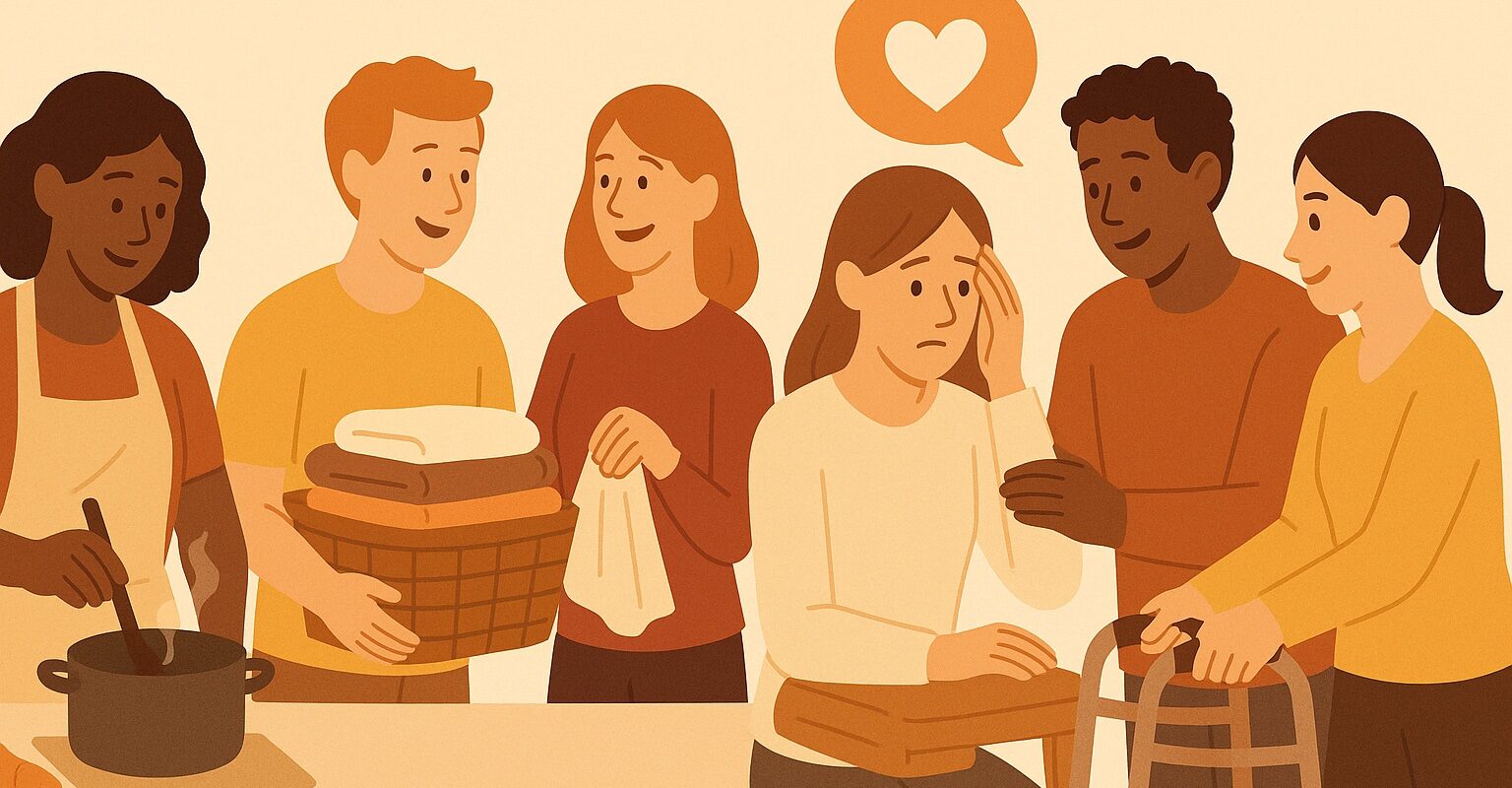
Leave a Reply